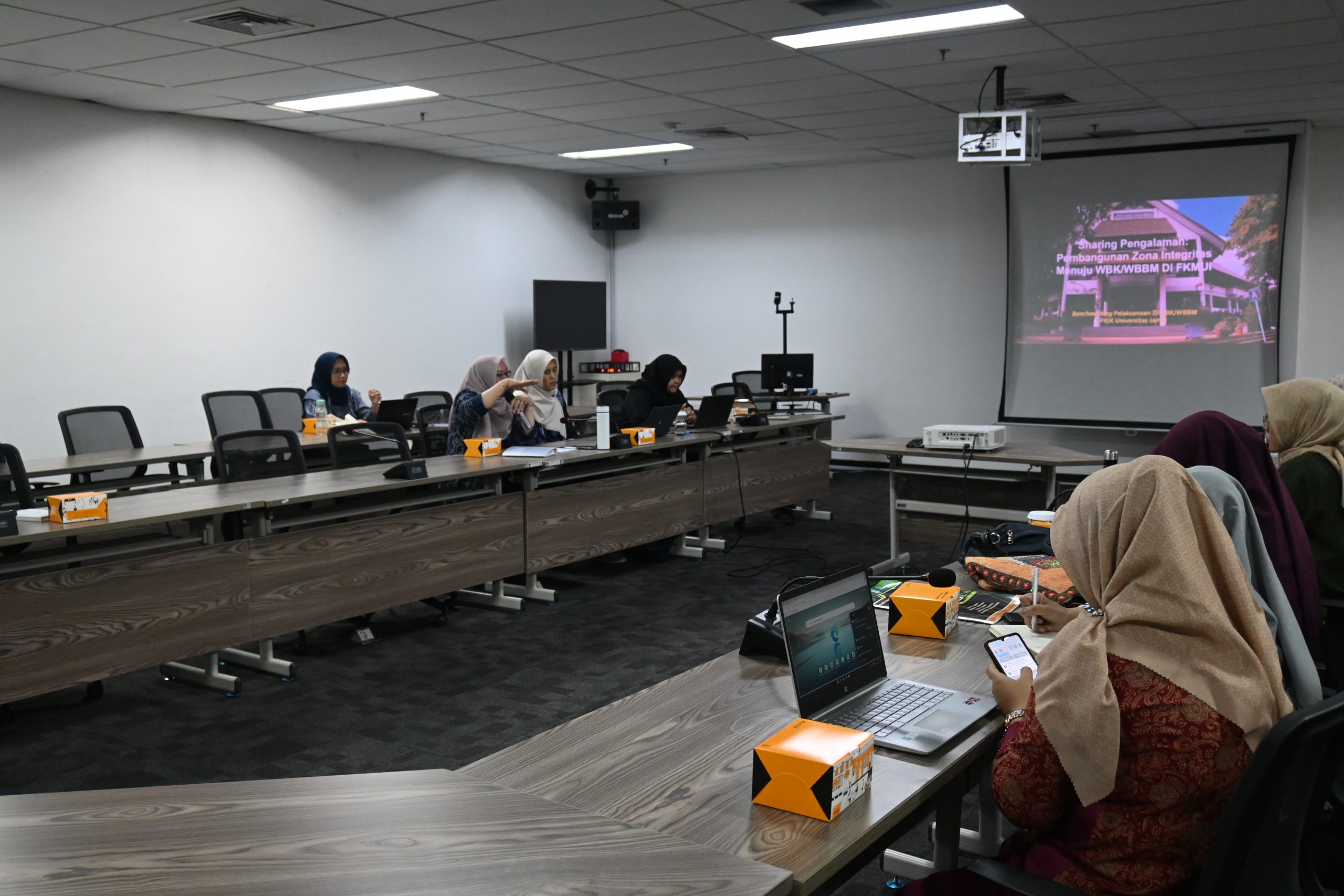On Wednesday, November 6, 2024, the Faculty of Public Health (FPH) at the Universitas Indonesia (UI) hosted a visit from the Faculty of Medicine and Health Sciences of the University of Jambi (UNJA) for a comparative study on the implementation of the Integrity Zone (IZ) towards a Corruption-Free Area (WBK) and Clean and Serving Bureaucratic Area (WBBM). The event, held in the Meeting Room of Building A, Health Science Cluster, UI, was led by Dr. Milla Herdayanti, S.K.M., M.Si., Vice Dean for Resources, Ventures, and General Administration at FPH UI.
The Integrity Zone is a designation awarded to government institutions, including universities, that are committed to implementing WBK and WBBM. The application of the IZ aims to create high-quality public services, with standards that are fast, accurate, affordable, safe, and easily accessible by the public. “The IZ is essential as a foundation to ensure that universities not only produce competent graduates but also graduates with integrity, who are ready to contribute to the nation,” said Dr. Milla.
Dr. Milla explained that FPH UI’s journey toward the transformation into IZ WBK and WBBM began in 2019. “In that year, IZ-WBK was proposed, followed by the drafting of the integrity pact, the formation of the IZ team and change agents, socialization and education on IZ, improvements in the six leverage areas, service innovations, and monitoring and evaluation,” said Dr. Milla. In 2021, FPH UI officially received the IZ-WBK designation, followed by the establishment of integrity sprouts, the application of ISO 37001:2016 (Anti-Bribery Management System), and the Anti-Bribery Compliance Commission (KKAP) in 2022. That year also marked a milestone for FPH UI in public service innovation and IZ mentoring for internal UI and other State Universities (PTNs).
In 2023, FPH UI began implementing integrated management with ISO, Training Need Assessment training, and revisions to the Circular Letter on gratuity prevention. “Finally, in 2024, FPH UI has implemented WBBM, with an emphasis on socializing gratuity control in accordance with Rector’s Decree No. 4 of 2024 on UI’s Code of Ethics and Behavior, as well as establishing the Student Well-being Center to support student welfare,” explained Dr. Milla.
On this occasion, Nelasari, S.K.M., M.K.M., Secretary of FPH UI, also shared important stages in the development of IZ at FPH UI, along with innovations and strategies to overcome various challenges in the implementation of IZ. Nelasari stated that the development of IZ at FPH UI consists of six stages, starting from leadership commitment to monitoring and evaluation stages to periodically assess and improve the implementation of IZ. “During the development of IZ, FPH UI also faced various challenges, including resistance to changes in long-established organizational culture, leadership changes, limited resources, and suboptimal coordination between work units,” said Nelasari. “The strategy taken includes intensive internal communication to drive changes in work culture, training and development of human resources, and the use of digital technology in monitoring and evaluation to improve service efficiency,” she added.
The Dean of the Faculty of Medicine and Health Sciences of the University of Jambi, Dr. dr. Humaryanto, Sp.OT, M.Kes., expressed his appreciation for the opportunity to share experiences provided by FPH UI in the application of the Integrity Zone. Dr. Humaryanto stated that the University of Jambi is also preparing similar steps to develop public services that are inclusive and have integrity, especially in addressing sensitive and important issues for the campus and the surrounding community. “We at the University of Jambi are preparing several strategic steps to ensure more inclusive services. Our main focus includes handling cases of sexual violence, bullying, and the development of services that are friendly to elderly groups,” explained Dr. Humaryanto. The Dean of the Faculty of Medicine and Health Sciences of the University of Jambi further added that special attention to these aspects is expected to address the needs of various groups, particularly vulnerable populations that often require additional support in the academic environment.
Dr. Humaryanto hopes that through this comparative study, the University of Jambi can adopt the best practices implemented at FPH UI and apply them according to the university’s internal needs. “We are optimistic that this program will not only benefit the academic community but also the broader society,” he said. With the support and commitment of all relevant parties, the University of Jambi aims to build a campus environment that is safe, comfortable, and responsive to the needs and aspirations of society, while supporting an academic culture free from corruption and misconduct.
The comprehensive implementation of IZ has enabled FPH UI to maintain the quality and integrity of academic services while continuously making improvements. The visit from the University of Jambi for a comparative study on the application of the Integrity Zone reflects the shared commitment of both institutions in building a clean, transparent, and inclusive bureaucracy. This meeting is expected to serve as an inspiration for other universities to continue innovating in creating an academic environment with integrity and providing responsive and friendly public services to all layers of society.

